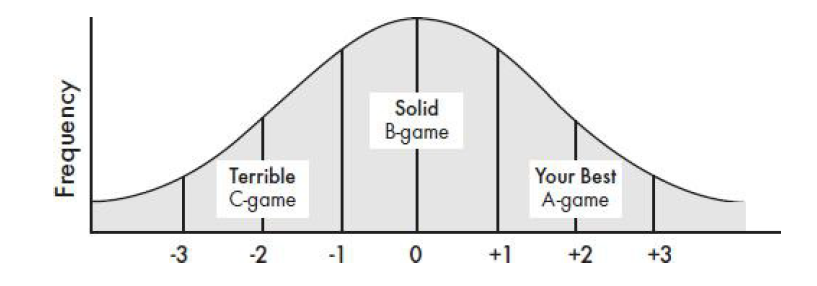Learning Model – The Worm Concept
“The Worm” is a concept with a peculiar name that helps to better understand the learning process. It is not a new revolutionary idea, but rather observations about how improvement occurs over time. Indeed, there may be some aspects you have never considered before. A clear understanding of this concept will help you:
- Form a more productive approach to improvement.
- Consistently improve while avoiding common pitfalls.
- Avoid unnecessary struggles with things you cannot change.
- Understand the significance of skills in the learning process.
- Manage the ups and downs of the learning process.
There will be days when it seems like you've taken a huge step back, are not progressing at all, or have reverted to your old habits. When this happens, return to this section.
To understand the “worm” concept, start by thinking about the range of your poker (psychological) game, which naturally exists in the quality of your play. Consider the quality of your decisions when you are playing at your highest level with maximum concentration and when you are completely unfocused. In other words, how well do you play when you are focused and how poorly when you are completely unfocused?
To illustrate this idea, let's say that over the last 6-12 months you have rated each decision you made at the poker table on a scale of 1 to 100 (where 100 is the best and 1 is the worst). Plotting these scores on a graph would show a bell curve.

The right or positive side represents your best decisions, while the left negative side represents your worst decisions.
This bell curve represents the natural range of decisions that exist in every player's game – even shortstackers. Whenever you play poker, there are certain aspects that reflect your best and worst capabilities. Playing poker perfectly over the long term is impossible. There are moments when you play perfectly and moments when the opposite is true. Poker is a dynamic game that is becoming increasingly competitive. This means that perfection, or at least solid play, is a moving target. You learn as your game improves. If you are learning, it means the quality of your decisions has a certain range.
Poker is not the only example where a range exists. It exists practically everywhere, especially in professional sports. Take any player from professional sports and evaluate their skills over a period of time. You will get the same bell curve. For example, football players can make impressive passes but miss guaranteed opportunities.
When closely examining your game, it is very important to acknowledge that this range exists. Evaluate reality as it is, not as you wish it to be. Look at the strengths of your game, which are reflected on the right side of the curve. These are decisions made when your thinking is at its highest level, making them much easier because you have a solid understanding of your opponents and know what you are doing at the table. Generally speaking, you have a great mindset and understanding of the game.
The right side also reflects newly acquired information, instructional videos, interactions with other players, etc. – everything that allows you to make even better decisions than usual. Remember, these are skills attributed to conscious competence and cannot yet be considered a solid part of your game.
On the other side of the curve are all the bad decisions. These are all the mistakes you know you shouldn't make but still do. Often, these mistakes are related to problems in your psychology, such as not thinking in big pots and folding the best hand; underestimating your opponent because you are bored; tilting and playing too aggressively with far more hands than you should. Undoubtedly, these are things you want to eliminate from your game because they cost a lot of money, cause frustration, confusion, and confidence issues. This book is designed to improve your psychological game, which means you will no longer make the same mistakes and will play closer to your mental capacity more often.
The worm concept clearly shows how your poker game range changes over time.
When your abilities reach new heights, the front part of the range (like the worm) takes a step forward. What was the best you could do just got even better. This also means that the range has expanded because the bad side of the game has not yet moved. The most effective way to move forward again is to focus on the left side of the range and work on your weaknesses. By eliminating the biggest weaknesses in your game, you will push your game curve forward.
This concept illustrates how continuous improvement occurs by taking one step forward with both the front and back parts of the curve. The essence of the concept:
- Improvement is two-sided: enhancing both strengths and weaknesses.
- Playing at the highest level is a moving target because it always depends on your current game range.
- By eliminating your psychological and technical poker game weaknesses (C-game), you make room for new information, thus creating the potential to reach an even better highest level (A-game). Yes, this means that your best level can be even better.

CLIENT STORY
Niman “Samoleus” Kenkre $5/$10 – $25/$50 NLHE
Bluefire Poker School Coach
It may seem a bit unusual, but I started working with Jared when my game was at its highest level. I had been successfully playing poker for over five years but faced serious difficulties at the end of 2009. At that time, I was playing very poorly and was somewhat mentally broken. I resolved all the difficulties myself and met with Jared when my game had already improved because I thought that with a better mindset, I could more effectively absorb new information. Additionally, I thought that working with him would protect me from similar downturns.
Initially, I was very skeptical of psychological game coaches. What could he possibly tell me that I didn't already know? I expected something like “stay calm,” “don't worry about the results,” “imagine yourself winning,” and similar nonsense you can read about in forums. But I was surprised. Jared actually has a fantastic learning system that had a very quick effect.
He talked about concepts like the “worm” in a context I had never thought of before. Understanding how my weaknesses were related to my strengths was eye-opening. I always thought that my A-game and F-game were two different things. Jared helped me understand how everything is connected, leading to systematic and clear improvement as a player. Now I understand that I have to work hard to improve my F-game so that it becomes at least a little better than it was yesterday.
I also never understood that emotions are part of the learning model. To my surprise, just knowing more about it completely eliminated the negative effect that emotions had on my game until then. Everything about the unconscious competence concept changed my approach to the game.
The unconscious competence concept may be the most important thing Jared taught me. When I tilted, one of my biggest weaknesses was getting very frustrated when other players 3bet me in position with hands they shouldn't even be playing. Then I would overestimate my hands and get very tilted by such opponents' play. It was my weakest point, and I knew it, but I could never focus on this problem. Jared just laughed and asked me, “Are you saying that opponents are not allowed to play in a way that throws you off and makes you play poorly?” When I looked at everything from a different angle, I realized that my emotional reactions were just trying to cover up my biggest weaknesses. I dealt with this problem, and now my mind works much better in such situations. I still get frustrated, but my game doesn't suffer because it has reached the level of unconscious competence.
Now, every time I play, I think about the game itself in the context of the learning model. My bad emotions come out much less often, and when they do, they don't affect my game as they used to. This is another important thing I learned from Jared. After a few sessions, I concluded that setbacks would no longer tilt me as much because I now have an understanding of it.
Emotions will always be there, but just knowing that helps to manage them better. I have been playing poker professionally for five years, and during that time, nothing has had a more positive impact on my game than those lessons with Jared. To be honest, nothing could even compete with that.
This series of articles is based on Jared Tendler's poker psychology book: “Mental Game of Poker”. Those who wish to purchase the original, which is in English, can do so at amazon.com





